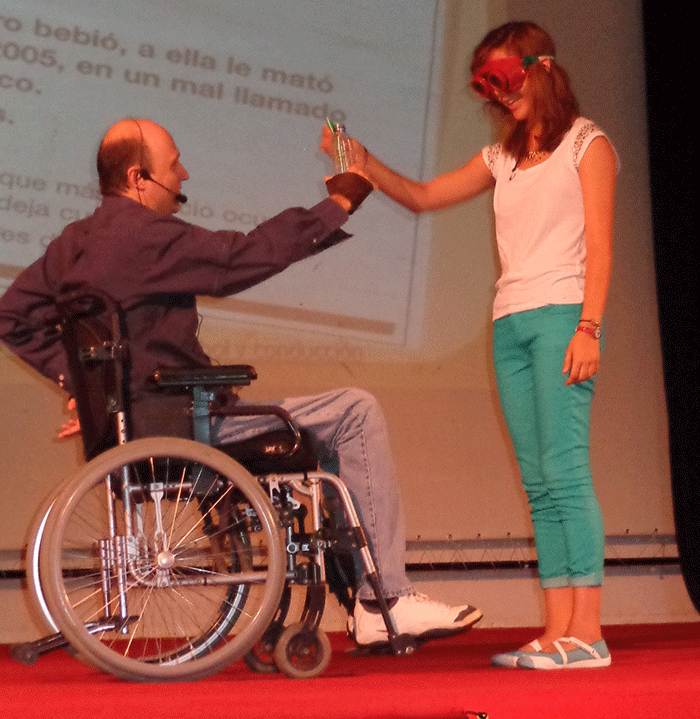 The campaign, "If You Control, You'll Return", aims to convey young people over 16 years, obout alcohol and other drugs is totally incompatible with driving any type of vehicle. Purpose: To reduce the number of injuries and fatalities in traffic accidents due to alcohol and other drugs.Target Audience: Youth of 1st and 2nd degree, as well as vocational training.
The campaign, "If You Control, You'll Return", aims to convey young people over 16 years, obout alcohol and other drugs is totally incompatible with driving any type of vehicle. Purpose: To reduce the number of injuries and fatalities in traffic accidents due to alcohol and other drugs.Target Audience: Youth of 1st and 2nd degree, as well as vocational training.
METHODOLOGY
- AESLEME´s monitors in a wheelchair because of an accident and trained in road safety, impart a ninety-minute training session, about the effects of alcohol, drugs and other addictive substances in relation to driving.
- Also, to close knowledge of the effects of alcohol, a special glasses are used simulating a high BAC (blood alcohol content). When a volunteer wears the above glasses, is asked to perform a series of very simple exercises, such as trying to pick up a pen from the hand of the speaker, serving water, trying to catch a tennis ball thrown from a short distance, etc… And he/she realizes he/she can’t do it.
CONTENT: PARTS
1) Alcohol and traffic
2) Alcohol and its effects
3) Rates of alcohol
4) Effects on the body and on driving: Decreased reflexes, low alertness, concentration, endurance and ability to move, as well as visual field, hearing acuity and red perception. Increase reaction time. False perception of distances and speeds. Overvaluation own abilities.
5) What does the law?
6) Driving and drugs: Drugs and their effects. Altering drugs (cannabis, marijuana, mescaline, LSD). Stimulant drugs (cocaine, amphetamines, caffeine, snuff). Synthetic drugs (ecstasy, morphine, heroin, methadone). Effects on the body, impact, most common offenses.
7) Myths and misconceptions alcohol environment: Demystifying the many beliefs and ideas that have been generated among young people about the effects and virtues of alcohol. Explain how many of these ideas are wrong, even though we have heard them so many times and taken as normal. Consequences, when driving, to believe these false claims.
8) If you drink, why do you drink?: Explain how some behaviors directly relate to alcohol and other drugs among the youth population are unfounded ("It helps to flirt", "everybody drinks", "It gives me confidence in myself and I overcome shyness "," to forget problems "," I'm more encouraged ", etc..).
9) Persuasion Tactics, Rebel!: Given that alcohol consumption among young people is often done in group, we show them how the decision to drink is sometimes conditioned by the environment and group´s pressure. Different forms of persuasion by the group and strategies to face such pressure.
10) Colloquium
At the end of the conference, we deliver educational material, as a book´s separator, with the top tips.
STAFF SCHOOL OPINION
The teacher who attends, answer a questionnaire at the end of the conference. This action aims to know his opinion about: content, duration, effectiveness, quality of the speakers, etc..
EVALUATION (questionnaire)
Students complete a questionnaire that gives us a very valuable information.
- The subjects in which students show a greater ignorance are:
- Effects of beer in BAC.
-Rates of alcohol allowed for novice drivers.
-False beliefs about the positive effects of alcohol and drugs on driving.
-Misconceptions about tricks to fool the breathalyzer when blowing.
- Wrong-Differentiation between the effects on the conduct of distilled and fermented drinks.
For further information: Memoria 2021
http://aesleme.es/index.php/actividades/prevencion-de-accidentes/59-si-controlas-vuelves